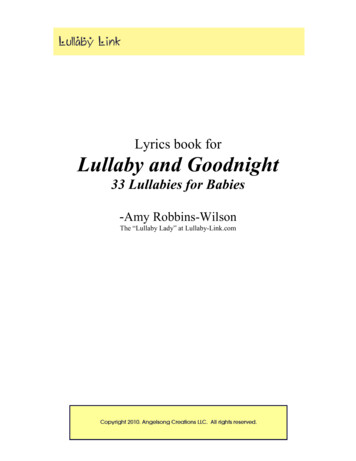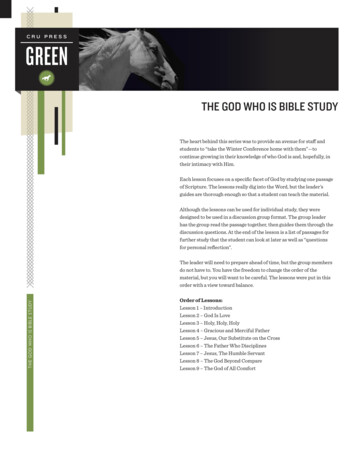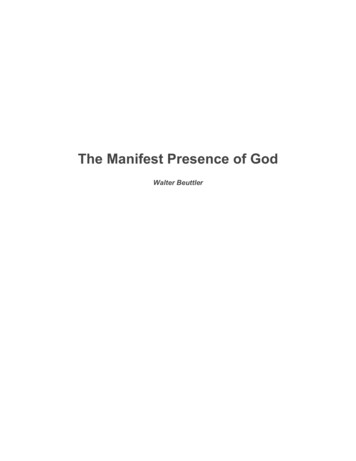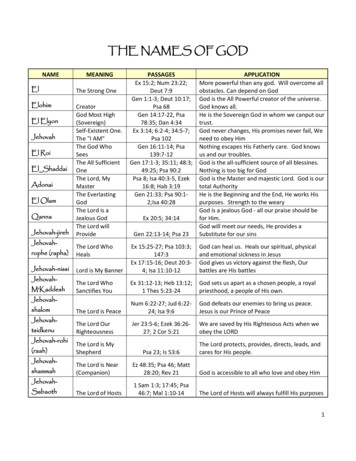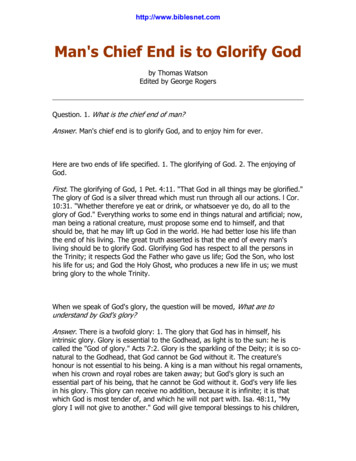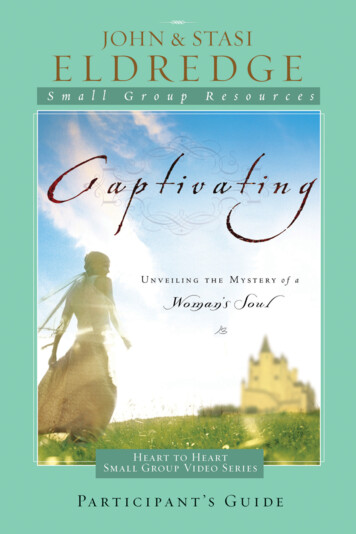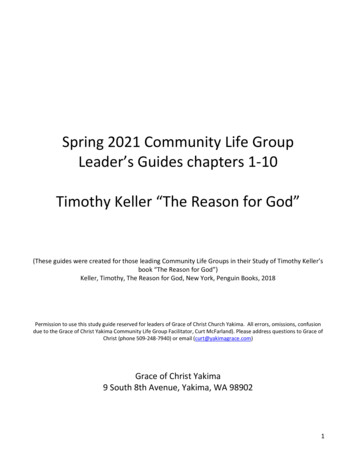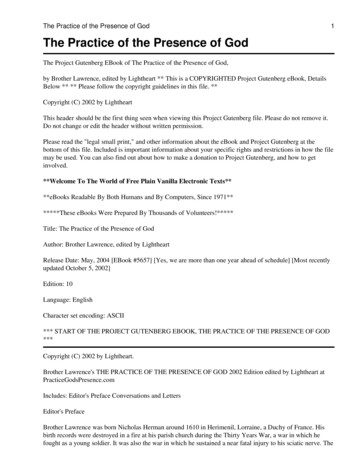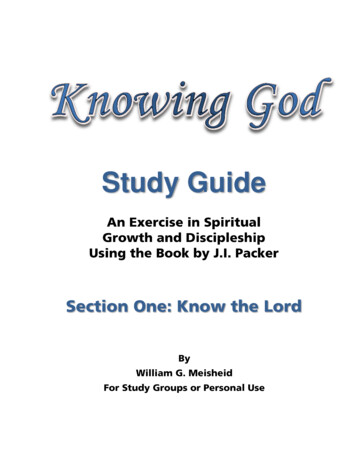
Transcription
Study Guide
Sageline Publishing502 Oella AvenueEllicott City, Maryland 21043 2000-2011 by Sageline PublishingAll rights reserved. Published 2011Printed in the United States of AmericaThis work is licensed for use under a Creative Commons License. You are free to print, copy, distribute,and transmit this work. It may be printed as needed for personal or group studies as long as it is done freeof charge and unaltered. Portions may be used with attribution. For further details please 0/.Bible translations are quoted within the copyright owner’s designations and are as follows:NKJV: All Scripture quotations when undesignated are from the New King James Version (NKJV) Bible,copyright 1979, 1980, 1982 by Thomas Nelson, Inc. Used under fair use guidelines. All rights reserved.NRSV: The scripture quotations designated (NRSV) are from the New Revised Standard Version Bible,copyright 1989 by the Division of Christian Education of the National Council of the Churches ofChrist in the U.S.A. Used under fair use guidelines.NIV: The scripture quotations designated (NIV) are from THE HOLY BIBLE: NEW INTERNATIONALVERSION . Copyright 1973, 1978, 1984 by International Bible Society. Used by permission ofZondervan Publishing House. Used under fair use guidelines. All rights reserved.ESV: The scripture quotations designated (ESV) are from the THE ENGLISH STANDARD VERSIONBIBLE with Apocrypha, copyright 2001 by Crossway Bibles. Used under fair use guidelines. All rightsreserved.All other translations that are quoted are, to the best of our knowledge, within the public domain and arefree for use without specific copyright notice and/or recognition.All works within this work which are not the authors’ original writings, art, design, or other creativeexpression are noted and to the best of our knowledge are used within copyright laws and restrictions orused under fair use guidelines.This is a not-for-profit work.
While many books and authors have passed through Christian awareness over the centuries, periodically abook comes along that strikes a cord deep in the Christian community. Knowing God by J.I. Packer is onesuch example. This insightful book has stood the test of time and has challenged Christians at every level ofmaturity not only to know about the God they profess, but to get off the balcony of observation and get ontothe road of discovery and come to know their God intimately and personally.For a detailed view of the life of James Innell Packer see the biography by Alister McGrath. But to help youget started, here is a quick overview of his life.Packer began life in the working-class neighborhood of Gloucester, England. He never quite fit in, which isnot unusual for a bookish child with an intellectual bent, but a “violent collision with a bread van” at the ageof seven set him on the course his life would follow. While running away from schoolboys who were tauntinghim, he ran out into the street and was hit by a van, resulting in a severe head injury. A metal plate wasinserted in his head. Exposed and with rubber softening its edges, Packer felt like “A speckled bird,” makingit even more difficult to fit in. The restrictions the accident placed on his teenage life, which meant no sportsand limited physical activity, steered him instead to a life of reading and intellectual curiosity. At the age ofeleven, expecting a bicycle for his birthday, he instead got a typewriter. That, coupled with the results of hisaccident, sealed his life’s direction. While he had in many ways an extremely difficult life, he had an innatepluckiness that served him well over the years.His faith, initially the product of parents with whom he regularly attended church, took a personal turn insecondary school (what we in the U.S. would call high school). In college, reading C. S. Lewis, among others,and his studying the Bible brought him to a point where at a meeting of the Oxford Inter-Collegiate ChristianUnion (OICCU, or CU) he finally made, “A personal transaction with the living Lord, the Lord Jesus.” Hisnewfound faith did nothing to mitigate his sense of isolation and that might be why he began to appreciate andstudy the great Puritan authors, themselves isolated from the mainstream of English society in their lifetimes.Several quotes illustrate his attachment. “The Puritans answered those questions that perplexed me. From thePuritans, I acquired what I didn’t have from the start—that is, a sense of the importance and primacy of truth.”Unlike his Puritan mentors and despite his own isolation, he was ordained in the Church of England.However, it was at an accidental speaking engagement that the course of his life would change. He met hiswife Kit and at the same time broke through his long-standing fear of being in large public situations. Theywere married in July of 1954.After writing his first book, Fundamentalism and the Word of God, a critique of Christian Fundamentalism, in1958, he has gone on to author over forty books (and still counting) as well as editing countless others.However, he is best known for the book we are studying. Packer is also well known for his linear “habit ofmind” and style of communication. Once he starts speaking on a thought he simply cannot stop until he hascarried the thought to its logical conclusion. This predilection has led to many difficulties for Packer over theyears. I have a very similar bent and I fully understand the problems this state of mind causes both to oneselfand those you interact with.While reading through Packer’s Knowing God can be memorable, and has been for uncounted numbers ofChristians, studying the book chapter by chapter changes lives. I have seen those changes happen again andagain over the years as I have lead cover-to-cover studies, using a one week per chapter format. While thistakes about twenty-eight weeks to complete (twenty-two chapters,introductory material, section reviews, and follow-up), it allows ample time for the contemplation of each ofthe truths that Packer introduces, time to delve into the scriptural references supporting those truths, and thespace to consider the depths of each claim that Packer makes. As faithful Christian students, our goal is to belike the Bereans, to question everything that is said to see if it is true. This study should be no exception.In addition, let me say that while the study of good books can help to focus the growth of a Christian, I havealways thought that discipleship can only be successful if it was centered squarely in the cross of Jesus Christand its true meaning of sacrifice, the “not my will, but thy will be done” that lies at the root of Christ’s
sacrificial decision. My goal for everyone who uses these materials to study Knowing God, is that they willfind the cross of Jesus Christ taking its rightful and necessary place at the center of their lives. If that happens,then I will have been a “good and faithful servant.”Every meaningful endeavor in life should be grounded in prayer, and this is no different. May this prayer,used as you go through the study, aid you in your efforts.Dear Lord God, you have challenged us in your Word to study to show ourselves approved and told us toleave aside the milk of the Gospel and mature into its meat. Therefore, open our hearts, O Lord, and prepareus to learn the essence of who you are, to drink deep of your revelation of yourself. And, as we come to knowyou better, O Lord, may we also come to better know ourselves. Grant us, by your grace, success in ourefforts. We thank you, O Lord, for your mercy and patience with us as we struggle to understand both you andourselves better. May everything we do be done to your honor and glory. Amen.William Meisheid
PREFACE . ICONTENTS . IIIPREVIEW OF KNOWING GOD . 1PREFACE: THE POSTMODERN WORLD . 3SECTION ONE: KNOW THE LORD . 7CHAPTER 1: THEOLOGY AND THE STUDY OF GOD . 9CHAPTER 2: THE PEOPLE WHO KNOW THEIR GOD .15CHAPTER 3: KNOWING AND BEING KNOWN .22CHAPTER 4: THE ONLY TRUE GOD .28CHAPTER 5: GOD INCARNATE .35
CHAPTER 6: HE SHALL TESTIFY . 41REVIEW OF SECTION ONE: KNOW THE LORD . 48RESOURCES . 54
As we begin this study, let’s look at the way Packer structured his material and why this book is worthstudying over and over again. Some of you may rightfully ask why is this book worth all of this attention;maybe we could just read it once or twice, but study it over and over again? Well, it is worth it for severalreasons:1. As a study of the nature and person of the Christian triune God, its subject matter isinexhaustible.2. Its arguments are firmly rooted in scripture and touch almost every area of the Bible where itdeals with the nature of God.3. Every time I have gone through it I have discovered something different about the God whoredeemed me and have been confronted with the decision about how I should respond to thatknowledge.4. Some things just need to be done over and over again to keep us on track. This book is likegoing to theological spring training and as a biblical athlete, I want to get ready for each newseason of Christian challenges God brings into my life.That being said, I just enjoy the way Packer writes, his turn of phrase, his insights. In addition, as I havegotten older I have begun to appreciate John’s statement at the end of his Gospel, “Jesus did many otherthings as well. If every one of them were written down, I suppose that even the whole world would nothave room for the books that would be written.”With John’s statement as a backdrop, there will always be a new book, with a new slant, or a new focus,or some new insight. To the writing of books there is no end. So now, when I find a good book that mightbe worth studying, I read it, and if it is as good and timeless as I had hoped, I will add it to my list andprobably study it several times in the time I have left on this earth. I am reminded of the song that FrancoZeffirelli has St. Francis sing in his movie Brother Sun, Sister Moon. The refrain goes as follows: “Dofew things, but do them well, take your time, go slowly.” That thought has stuck with me and as Iapproach the third stage of my life, rather than rushing around trying to do all the things I think I havemissed (the proverbial bucket list), I am actually slowing down and cutting back. I am trying to do fewerthings, but to do them well. As to this book, I have decided that knowing a book worth studying verywell, is better than knowing a lot of books poorly. If you are wondering what books I consider worthstudy over and over, I will note them at the end of this entry. For now, let us focus on this book.Dr. Packer divides his book into three main sections:Section One: Know The Lord. Packer begins by dealing with the nature and focus of the study. Helooks at theology and the people who study it. He discusses the nature of knowing and being known andhow that applies to our relationship with God. Then he looks at God himself and his revelation abouthimself as three persons: Father, Son, and Holy Spirit. He introduces the Trinity by way of the incarnationand fleshes it out with the one who testifies, the Holy Spirit. This section is the foundation for the othertwo sections.Section Two: Behold Your God! After building his foundation in Section One, Packer now addressesthe substance of who God is by examining his attributes, both communicable and incommunicable andwhy the difference matters. For example, in Chapter 10: God’s Wisdom and Ours, Dr. Packer notes thatwe are created in the image of God, possessing only his communicable attributes, while one of the rootsof sin and pride is our (and Satan’s) desire to possess God’s incommunicable attributes. Packercontinually grounds the attributes of God in our relationship with Him, which makes it much easier tounderstand them, and the God who possesses them.Section Three: If God Be for Us In his closing section, Packer takes the knowledge gained in the firsttwo sections and applies it to living out the Christian life. He addresses the heart of the gospel and how
that allows us to become Sons of God. He explores how God leads us through our life and gives insightsinto dealing with the trials and tribulations that will eventually come our way. He closes with our blessedassurance, the adequacy of God for the Christian.One of the problems I have seen over the years of teaching this study is that people find the end ofSection One and most of Section Two difficult and demanding, so if they stay with the study they begin toskim and skip. They pass the time to the “good stuff” in Section Three where we deal with ourredemption and God’s grace and love. However, they do so at a terrible price, since without a firm graspof who God really is, they fail to build the foundations of their understanding on solid rock, ending upwith a haphazard and weak footing for their faith.Please believe me when I say that a diligent study of the first two sections brings several orders ofmagnitude greater appreciation and understanding of the blessings and truths in Section Three. Iremember a biting critique of Pentecostal/Charismatic Christians that I heard in the early ’80s. Theminister, a Scottish Presbyterian, said that maybe one of the reasons people go flitting from place to placeseeking a new and exciting experience of God is because they have failed to know and understand whothis God they seek really is and to appreciate the marvelous gift of salvation and new life in Jesus ChristHe has given them in the first place. Being Charismatic, I took that admonition to heart and it energizedmy second effort at studying Knowing God.In closing I said I would tell you what books I believe are worth repeated studying. Other than the bible,there are four books besides Knowing God that have been significant for me. They are: Knowing Scripture by R.C. Sproul and Robert Wolgemuth. This short book helps you examinehow you approach the bible and introduces hermeneutics in a way that almost anyone canunderstand. A Long Obedience in The Same Direction by Eugene Peterson. Eugene is best known for hisparaphrase of the Bible, The Message. In this book he addresses the failure of Christiandiscipleship due to corroding effects of our instant society, where instant gratification andimmediate results are expected. Eugene uses the Jewish Psalms of Ascent as his source materialto emphasize both obedience and the length of the long quest. It is hard for many Christianstoday to grasp the idea of Christianity being a long quest, but Christian discipleship is a lifelongjourney, not a point of arrival. Scripture Twisting: 20 Ways the Cults Misread the Bible by James Sire. In this book Sireexamines the common methods used to distort the scriptures, which helps to see when others are“twisting scripture”. It also confronts us when we twist or distort the Scriptures to meet our ownprejudices. The Universe Next Door: A Basic Worldview Catalog, 5th Edition by James W. Sire. Sireexamines the “set of presuppositions which we hold about the basic makeup of our world.” Our“worldview” or as I like to say, the water in which we swim, colors everything we know andunderstand about the world. Each new edition of this book adds new and important material andinsights.Thank you if you order these books from my links. There you have it. May God bless your efforts as youengage this study. Grace and peace to your day and please keep me in your prayers.
Pushing back the void with anxious activity.Luke 12:29-31, “And do not seek what you should eat or what you shoulddrink, nor have an anxious mind. For all these things the nations of the world seek after, and your Fatherknows that you need these things. But seek the kingdom of God, and all these things shall be added toyou.”“The ‘system’ must have freedom; it must have abundance, and it must have infinite variety. Profit is theaim, happiness the desire, and consumption the means. Hollywood and company manufacture dreams andmodels for us to mimic or wish for. Desire is awakened, stimulated, encouraged through the perpetualbombardment of images and wishes.” “What is Good and Who Says?” Stuart McAllister, Just Thinking,Spring/Summer 1998, Ravi Zacharias International MinistriesWe are all affected by the “water in which we swim” or the gestalt (integral pattern, form, shape) of ourdaily lives. We cannot avoid the time in which we live and how it influences who we are and how wethink.1. Considering the above quote and the pervasiveness of modern influences and intrusions intoour lives, how will you find the necessary quietness, clarity, and perseverance to pursue thisstudy?If these kinds of challenges excite you, rouse the best in you, then you are a prime candidate to take thisjourney with us.In Packer’s 1993 Preface, he says the editor who commissioned the original articles that became KnowingGod wanted something for “readers who were fed up with facile Christian verbiage” [simplistic or toosimple explanations]. In effect, Packer was told to write Christian theology for ordinary people whowanted to dive below the surface and see the glories that resided in the deeper waters of the Christianfaith. This is the approach to Christian study for people who take Hebrews 6:1-3 seriously.“Therefore let us leave the elementary doctrine of Christ and go on to maturity, not laying again afoundation of repentance from dead works and of faith toward God, and of instruction about washings,the laying on of hands, the resurrection of the dead, and eternal judgment. And this we will do if Godpermits.” Hebrews 6:1-3
1. With that as background, what things might make it difficult for you to “leave the elementaryteachings about Christ and go on to maturity?” (Hebrews 6:1)2. In Packer’s 1973 Preface, using John Mackay’s illustration, he talks about the differencebetween a person who merely observes events and one who participates in them. Have youbeen mostly a balconeer, a watcher, or a traveler, a walker in your life? What is the essentialdifference between the two ways of living?3. Packer considers the “spirit of the age” to be a spirit that magnifies the human race and itsachievements, while relegating God to an afterthought. Think about why or why not you the“spirit of the age” has affected you in the various areas of your Christian life. If you have beenaffected, how has it affected you?4. According to Packer, the Renaissance ushered in an era of skepticism in which naturalisticthought denied God’s direct and complete control of this world. How do you think thisskepticism has affected you?
5. Why is theology important for the Christian Church and how has it failed us?6. What care must we take when we read books like Knowing God? Do you think this is a problemfor you personally? Why or Why not?You are now ready to dive into our study. Begin Section One by reading the Chapter 1: The Study of God.Think about how the “spirit of the age” and skepticism might be affecting your efforts as you read andthink about what is being said. Also remember C.S. Lewis’ sobering words on imagined success as youmove forward (see the end of the 1993 Preface).Of all the books I have read since becoming a Christian, apart from the Bible itself, one book hasconsistently both reinforced and challenged my ongoing efforts to become the Christian I have alwaysdesired to be. That book is Knowing God by J.I. Packer.Several years ago I came to the conclusion that though this is one of the most purchased books in theChristian community since its release in 1973, it may be by comparison one of the least studied. I say that
from personal experience, having studied the book with many groups. I believe it is because of how thebook confronts what you believe and understand about God, creating a waning interest in many (but notall) interest in putting in the effort to study. Let me say without reservation that it is impossible to studythrough this book and not be changed. In your walk (as a traveler, not a balconeer) through the challengesof this book, you will not be the same person at the end of your adventure as the one that started travelingthe journey that Dr. Packer has enticed you to make.I believe the reasons for the change in each traveler are as varied as the people who make the journey, butI expect the root of each transformation is found in Packer’s simple, yet profound title, Knowing God.Chapter by chapter, paragraph by paragraph, we as readers are confronted with two inescapable things:the true nature of the God with whom we have to do, and our understanding, opinions, thoughts, and evenprejudices regarding that nature. Over the years, this modest book (it is not overly long and is written in apopular style for the average Christian) has caused me more than a little heartache as I came face to facewith God of Abraham and Moses, as well as the Trinitarian understanding of His nature which is mostfully expressed within the writings of the New Testament.I have read many esteemed theological works, but this “popular” book has challenged my heart and soul(not just my mind) in ways those highly regarded works did not. I am not completely sure why this hasbeen so. It may be related to the insight of an old favorite, but now deceased, radio preacher, J. VernonMcGee. Dr. McGee liked to concentrate on what he said were the practical and common sense Gospelissues of where the “rubber meets the road”. I would give Packer’s book that abiding compliment. Ittouches me where my daily life intersects my understanding of God and in doing so changes me or maybeit is better to say that the Holy Spirit uses the book’s simple directness to challenge and change me as thescriptural arguments it presents find their touchstone in my everyday experiences. To use Dr. McGee’saphorism, it touches me where God’s rubber meets my daily road.You are welcome to use these materials as you see fit, respecting my copyright as noted in the CopyrightStatement. I covet your comments and observations, desiring anything that will make the study a bettertool to assist those who willingly take on Dr. Packer’s challenge.Think on Isaiah 65:10-12 and take to heart its admonition.“Sharon shall become a pasture for flocks, and the Valley of Achor a place for herds to lie down, for mypeople who have sought me. But you who forsake the LORD, who forget my holy mountain, who set atable for Fortune and fill cups of mixed wine for Destiny, I will destine you to the sword, and all of youshall bow down to the slaughter, because, when I called, you did not answer; when I spoke, you did notlisten, but you did what was evil in my eyes and chose what I did not delight in."There is no fortune or destiny outside the will of God.May God bless you in your transition from balconeer to traveler and may you, along with all those whocame before you, be granted the exceptional privilege of coming to know your God.
In Exodus 5:2, the Pharaoh of Egypt said, "Who is the LORD that I should obey him and let Israel go? Ido not know the LORD and I will not let Israel go."In Hebrews 8:11 it says, “No longer will a man teach his neighbor, or a man his brother, saying, 'Knowthe Lord,' because they will all know me, from the least of them to the greatest.”The following is taken from a poem by Edward William Bok (1863–1930). The Americanization ofEdward Bok. 1921. XXXV. At the Battle-Fronts in the Great War.I include this because everyone who becomes a child of God and then seeks to know him becomes asoldier in the fight for the Kingdom of God, a warrior standing against the forces of darkness.“For the passing souls we pray,Saviour, meet them on their way;Let their trust lay hold on TheeEre they touch eternity.Holy counsels long forgotBreathe again ’mid shell and shot;Through the mist of life’s last painNone shall look to Thee in vain.To the hearts that know Thee, Lord,Thou wilt speak through flood or sword;Just beyond the cannon’s roar,Thou art on the farther shore.For the passing souls we pray,Saviour, meet them on the way;Thou wilt hear our yearning call,Who hast loved and died for all.”
The difference between knowing about God and knowing GodPsalm 119:105, "Your word is a lamp to my feet and a light for my path.""To know God better is only to realize how impossible it is that we should ever know him at all. I knownot which is more childish—to deny him, or define him.” Samuel Butler (1835–1902), British author.First published in 1912. Samuel Butler’s Notebooks, p. 194, E.P. Dutton & Company (1951)."I know things. For instance, there are 108 beads in a Catholic rosary and there are 108 stitches in abaseball. When I heard that, I gave Jesus a chance. But it just didn't work out between us. The Lord laidtoo much guilt on me. I prefer metaphysics to theology." Annie Savoy in the movie Bull Durham, 1988"Theology, not morality, is the first business on the church's agenda of reform, and the church, notsociety, is the first target of divine criticism." Michael Horton, Reformed theologian and culture criticExistentialism pervades our postmodern, post-Christian world and seeps into our thinking througheducation, media, music, friends, and our general life experience.n. Philosophy. A philosophy that emphasizes the uniqueness and isolation of theindividual experience in a hostile or indifferent universe, regards human existence as unexplainable, andstresses freedom of choice and responsibility for the consequences of one's acts. Its adherents argueanything spiritual is unknowable and irrelevant to life. Adapted from the American Heritage Dictionaryof the English Language: Fourth Edition. 2000.1. How are you influenced by existentialism? If you think not, why not?2. How could existentialism influence our thinking as we study God, and how would that be aproblem?
To understand why it is necessary to study God (theology), not just what God asks us to do(biblical ethics - what Christians refer to as holiness or righteousness and is worked out in discipleship).Note: The first two questions address issues leading up to the questions for Chapter 1 of the book.1. We all want to better understand ourselves, to know why we do what we do; so then, why is itnecessary to study God to understand ourselves?2. What does theology mean to you? With that in mind, how does “theology” relate to studyingGod?3. Have you ever thought that God is hard or impossible to know? What is Packer’s solution tothis problem? What is necessary for you to take his advice?
4. Packer claims that if you are a Christian, you know five basic things (foundational truths)about God and he says that these should guide our study. Are any of these beginningassumptions a problem or difficulty for you or do you lack a basic understand of any of them?Which ones and why?5. For Packer, the study of God requires the study of what source materials? Do you think thesesource materials are adequate? What others would you add, if any?6. While studying God, Packer will use three basic themes about God to approach God. As webegin this study, express these themes in your own words and explain what they mean to you?7. Why are our motives and attitudes for pursuing this study important? What, according toPacker, should be our motives and our goal? What are some of the dangers we face?8. Psalm 119 (126 verses) has some important wisdom to help us understand about our pursuitof the knowledge of God. What is that wisdom?
9. Why does Packer consider Christian meditation important?10. How does Packer’s definition of meditation differ from other forms, such as those practiced inEastern religions? Can you think of any synonyms that might apply to your “meditating on thetruth”? Which synonym works best for you and why?11. After studying this chapter, how do you think knowing God is going to be different fromknowing about God? Can you do this on your own? Why or why not?Continue Section One by reading Chapter 2: The People Who Know Their God. Think about howexistentialism or self-satisfaction might be affecting your efforts. Begin this week by practicing yourChristian meditation using the truth you have learned in Chapter 1.Remember, for something to become a habit you have to do it every day for twenty-one days or threeweeks is a well-established brain model for effective rewiring of any habit you are trying to establish.One of our primary goals in this study is for proper Christian meditation to become a habit, to become anintegral part of our discipleship walk.In this first chapter Packer discusses the c
Knowing God by J.I. Packer is one such example. This insightful book has stood the test of time and has challenged Christians at every level of maturity not only to know about the God they profess, but to get off the balcony of observation and get onto the road of discovery and come to k

